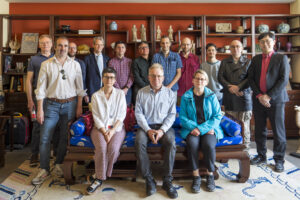By Prab G., Loyola University Chicago, Spring & Summer 2017 Student
Me in the PRC
I remember my first day arriving on the 18th floor of the Capital Mansion building in Beijing the same way I remember my very first day of school: eager, apprehensive, but also a strong intuition that I was out of place. Prior to the start of my internship at YouChange, I had already been living in China for about four months. Despite taking an intensive Chinese course, I felt that my progression/improvement was not nearly adequate enough to hold a meaningful conversation with my new colleagues. Since Punjabi was my first language, I had a similar experience when I first started school. This parallel between what seems like two different worlds was the start of my growth as both an individual and member within the work environment.
The language barrier was an obvious obstacle towards communication, especially since the other Chinese intern, Wenjing, spoke about as much English as I did Chinese. Nonetheless, this barrier did not impact effective communication. She spoke to me in broken English and I spoke back in bits of Chinese. Through our fragmented conversations of bits of Chinese and English (and a little help from Google Translate and Pleco), we were able to fill in the gaps of communication and cultivate a friendship by understanding each other’s cultural differences. For example, Wenjing offered me interesting Chinese snacks such as dried sweet and sour fish and marshmellows filled with blueberry jelly. Meanwhile, I offered her Cheezits (which she thought were the weirdest things). Even so, Wenjing brought an impartial enthusiasm to learn about a culture different from her own. I aim to be her reflection by appreciating the cultural differences both through our newfound friendship and during my time at YouChange.
About YouChange
YouChange (YouCheng), also referred to as China Social Entrepreneur Foundation, is a non-profit social organization driven with the vision for social innovation. YouChange focuses on philanthropy–their goal is to invest in social and environmental issues in a way that is sustainable. The founder, Madam Wang Ping, believes that in order to change the world, the mindset and perspectives of the people should be changed and steered towards a positive direction.
In China, YouChange leads the exploration of the potential of social innovation within China. The organization’s successes stem from both funding from the Chinese government and innovative ideas. One of the most successful ideas implemented by YouChange is the 3A system: Aim, Approach, and Action. This method tangibly targets the different steps and processes of implementing projects that will yield the greatest financial return and social progress.
YouChange has sixteen projects focused on social value (impact) investment. One of the projects provides rural women online entrepreneurship courses. These classes are beneficial because they teach women how to sell their products in a proper and profitable way. This differs from charity work because YouChange operates with the goal of leaving the beneficiaries sustainable in the long run without YouChange being heavily involved. Perhaps the most successful platform launched by YouChange is China Alliance for Social Value Investment (CASVI). This platform is also supported by United Nations Social Impact Fund (UNSIF). By partnering with UNSIF and fifty other organizations, CASVI communicates between social projects and impact investors in order to address eight key areas of interest: new energy, Medicare, elderly care, environment, poverty alleviation, education, safety, and health. These two examples are indicative of the power and growing scale of social impact investment within China that is led by YouChange.
Within the work place, there are mostly all Chinese employees with the exception of me and Anna. Most of the employees are also women. In my past work experiences, a language barrier was seldom an obstacle. Working at YouChange presents a unique opportunity to improve my conversational Chinese with my coworkers. However, my minimal knowledge of the language is not a barrier to my assignments at work. My tasks include transcriptions, analyzing and cross-comparing National Advisory Reports of different countries, research, and proof-reading the organization’s brochures and China’s National Advisory Report draft for coherency. These tasks require full attention to details, which I am accustomed to from my past work experience at Papyrus and North Shore Health Center. However, the translations from Chinese to English exposes me to the Chinese style of writing, which is both eloquent and colloquial. This unique opportunity to understand a different culture in a formal, business setting will prepare me better for working with others on an international scale.



